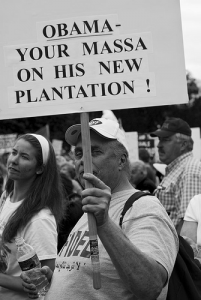The last white people in America, part II
Politics, US — By George Davis on March 26, 2010 at 8:52 am In early 2009, groups composed of the most tattered refugees from John McCain’s 2008 Presidential election defeat gathered in various places around the country. Those of us who were willing to admit the truth, knew all along the Teabaggers, as these groups came to be called, were not protesting wasteful government spending that would lead to higher taxes, increases in the national debt, or unnecessary growth of government. We knew the President’s race was the issue.
In early 2009, groups composed of the most tattered refugees from John McCain’s 2008 Presidential election defeat gathered in various places around the country. Those of us who were willing to admit the truth, knew all along the Teabaggers, as these groups came to be called, were not protesting wasteful government spending that would lead to higher taxes, increases in the national debt, or unnecessary growth of government. We knew the President’s race was the issue.
A few of them might share with others a genuine ideological opposition to the health reform bill that was recently signed into law. But ideological differences were not the reason for their protest. If so why did hecklers hurl the N-word and spit on African American members of Congress at the end of the health reform debate?
In 2009, a sign at a Teabagger rally read: “I want my country back.” President Obama and African American members of Congress had not taken their country. Obama had taken the illusion that America is, or ever was, a white country. And with the stripping away of that illusion, it is natural for those who held the illusion to feel that life itself was coming apart.
It is convenient to believe the Teabaggers do not represent the vast majority of those who voted for John McCain in the 2008 election, but now John McCain has said he will no longer work with the Obama administration on any issue, and a Harris Poll released this week found that among Republicans:
• 67 percent believe that Obama is a socialist.
• 57 percent believe that Obama is a Muslim
• 45 percent believe that Obama was not born in the United States
• 38 percent equate many of Obama’s actions to those of Hitler
• 24 percent say Obama “may be the Antichrist.”
In my post, The Last White People in America, Part I, I said I felt sad watching what Tom Brokaw called the “the greatest generation any society has ever produced” and their ideological descendants out at the Republican National Convention in St Paul in September 2008.
I pretty much agreed with the description that Brokaw gave of them in his book The Greatest Generation. Some readers of the Part I post believed that I said I felt sorry for them. I actually said I felt sad watching them. As I said:
“Their best qualities had been used against them. They were willing even eager to sacrifice material possessions, blood, sweat, and tears. They were worker-bees who never bragged about what they had done or complained about what they had been through (in WWII). They were loyal, patriotic, and practical.”
The flag-waving crowds at the RNC were sad to watch because they built the national economy, but the vast majority of the rewards flowed to the top of the white social hierarchy while in so many ways our national culture told them: Make yourself content. At least you’re not black.
The saddest part is that as a college professor I have seen how badly their education misleads them; as the son of generations of preachers it was evident to me at a very early age how their (our) religious institutions worked tirelessly to imprison them (all of us) in Biblical literalism.
As a journalist and novelist I know first hand how the books they (we) read, and how American films and television give the illusions America is, and was, a white country. In the new century, as my book, Until We Got Here, attempts to show, there is no way America got here without its’ rich non-white heritage as well.
Tags: African-Americans, Barack Obama, Obama, Politics, Talking about Race, tea party, teabaggersAuthor: George Davis (8 Articles)

George Davis’ nonfiction novel, Until We Got Here: From "We Shall Overcome” to "Yes We Can" will be published in 2010. He has taught at Columbia, Colgate and Yale universities and is professor emeritus in creative writing at the Newark Campus of Rutgers University. He is author of the bestseller, Black Life in Corporate America, and the novel, Coming Home, upon which the Jane Fonda Vietnam War film is loosely based. He has been a writer and editor for Essence and Black Enterprise magazines, The Washington Post, and The New York Times.


 Share This
Share This Tweet This
Tweet This Digg This
Digg This Save to delicious
Save to delicious Stumble it
Stumble it





 Waste` (wash-tay) Chicago; Omaha no good
Waste` (wash-tay) Chicago; Omaha no good The rush to judgment
The rush to judgment White Man's Burden Redux: The Movie!
White Man's Burden Redux: The Movie!







